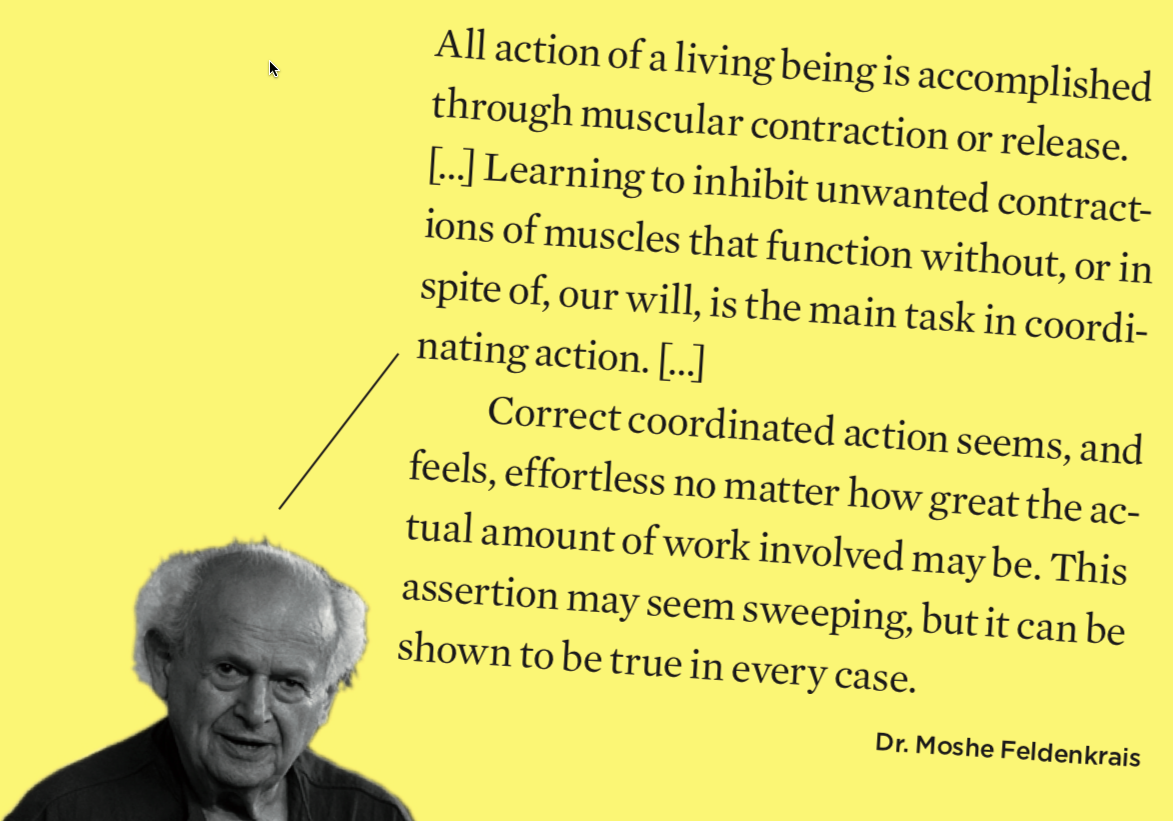Difference between revisions of "Holotopia: Convenience paradox"
m |
m |
||
| Line 21: | Line 21: | ||
<div class="col-md-3"></div> | <div class="col-md-3"></div> | ||
<div class="col-md-7"><blockquote> | <div class="col-md-7"><blockquote> | ||
| − | + | In the shadow of our cherished value—of instant gratification or <em>convenience</em>—reside a wealth of ignored opportunities for improving our condition through <em>human development</em>. When they've become known, the "great cultural revival" will most naturally follow. | |
</blockquote> | </blockquote> | ||
</div> </div> | </div> </div> | ||
| Line 53: | Line 53: | ||
<p>We let Moshe Feldenkrais too appear here ideographically, to point to the <em>physical</em> side of the <em>convenience paradox</em>: | <p>We let Moshe Feldenkrais too appear here ideographically, to point to the <em>physical</em> side of the <em>convenience paradox</em>: | ||
<blockquote> | <blockquote> | ||
| − | We build the technology to make life easy; but the lion's share of our effort is in the <em>way</em> in which we use ourselves—which can be | + | We build the technology to make life easy; but the lion's share of our effort is in the <em>way</em> in which we use ourselves—which can only be improved through <em>human development</em>. |
</blockquote> | </blockquote> | ||
| − | |||
| − | |||
</p> | </p> | ||
| − | < | + | </div> </div> |
| − | |||
<!-- XXX | <!-- XXX | ||
Revision as of 08:10, 8 June 2020
Contents
H O L O T O P I A: F I V E I N S I G H T S
Convenience paradox
The Renaissance liberated our ancestors from preoccupation with the afterlife, and empowered them to seek happiness here and now. The lifestyle changed, and the culture blossomed. How could the next such change begin?
Without suitable information to show us the way, we pursue convenience—what brings immediate gratification.
But convenience is a deceptive value, which surprisingly often leads to a less convenient condition.
In its shadow, there are a wealth of insights and opportunities that we can use to vastly improve our condition; through "human development", and "cultural revival".
Stories
In the shadow of our cherished value—of instant gratification or convenience—reside a wealth of ignored opportunities for improving our condition through human development. When they've become known, the "great cultural revival" will most naturally follow.
The way and the paradox
Lao-Tzu
According to tradition, Lao-Tzu or "Old Master", an ancient wise man of China, was on his way out of China to end his life in solitary contemplation. But the border guard would not let him leave, until he wrote down the essence of his wisdom for posterity.
We let the Old Master convey to us two insights:
- Instead of reaching out for the objects of our desire, must focus on our way of life—and harmonize it with the overarching Way of the universe
- The Way (called Tao) to the highest good is hidden from us by a paradox
We let the following excerpt from Tao-Te Ching, the book of wisdom that the Old Master's allegedly left to the border guard, summarize his message for us.
That the weak can defeat the strong—
There is no one in the whole world who doesn't know it,
And yet there is no one who can put it into practice.
The paradox of physical effort
Moshe Feldenkrais
The heaviest thing we ever lift up and carry is the one we can never get rid of—our body.
We let Moshe Feldenkrais too appear here ideographically, to point to the physical side of the convenience paradox:
We build the technology to make life easy; but the lion's share of our effort is in the way in which we use ourselves—which can only be improved through human development.

